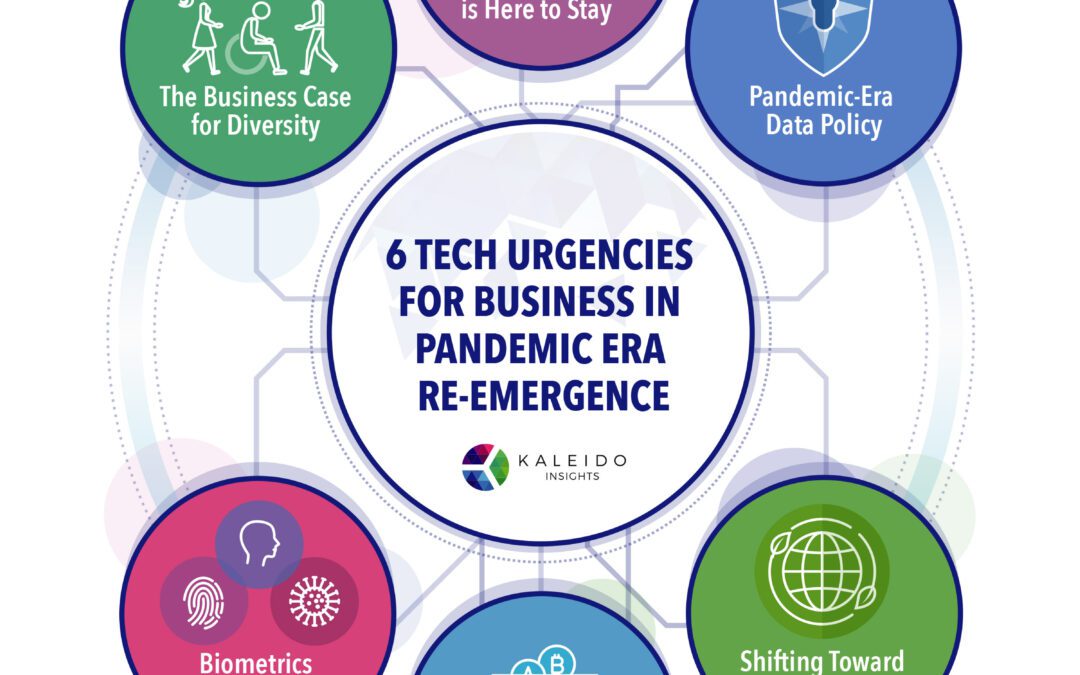As the world begins to re-emerge and rebuild, pragmatic leaders recognize the critical role technology plays in shaping the “new normal,” but are struggling to activate. The shifting technology landscape impacts the future of customer and employee relationships, breakthrough business models, societal trust, and even the health of our planet.
Kaleido Insights’ analysts are laser focused on six technology imperatives facing every business in 2021, which are critical to thriving in a post-pandemic future.

1. From Inclusion to Equity: The Business Case for Diversity
With societal inequities laid bare, technological implications offer new imperatives for companies to overhaul Diversity, Equity & Inclusion (DEI) programs and assess their role in inclusion. In pursuing the business and innovation impacts of diversity, efforts shift from incidental inclusion to proactively driving equity in investments, access, experience, power, opportunity, and outcomes. Bridging the “digital divide” is finally prioritized to further accelerate DEI initiatives internally and externally.
Key topics for leaders: DEI, Employee Resource Groups (ERGs), Social Contract, Inclusive Design, Algorithmic Bias, Digital Disenfranchisement, Accessibility Tech, Digital Footprint
2. Blurred Roles: Hybrid Work is Here to Stay
2020 brought dramatic shifts in office environments, work-from-home arrangements, and accelerated automation adoption. The future of work is here, and every organization must adapt its technology, employee engagement, and innovation strategies to the reality of virtual work and a more distributed workforce. As work and personal life blur for employees and artificial intelligence (AI) becomes mainstay, a “hybrid workforce” takes on a whole new meaning.
Key topics for leaders: AI, Automation, Collaboration Tech, Virtual Reality (VR), Augmented Reality (AR), Social Audio, EdTech, Gig Economy, Mental Health
3. Protection Matters: Pandemic-Era Data Policy
As public health, political, economic, and technological tensions compound, organizations are pressed to re-evaluate their roles as stewards of data. State, country, and international data protection laws continue to be drafted and enacted, shining a light on a wide array of tech policy, privacy, and security needs, and their impacts on our expectations around data and digital innovation.
Key topics for leaders: Data Stewardship, Data Policy, Privacy Policy, Transparency, Trust, Algorithmic Amplification, Disinformation, Cybersecurity, Digital Literacy, Contact Tracing, Surveillance Tech, Emotive Tech
4. Redefining Wellness: Biometrics Go Mainstream
With public health front and center, companies race to recalibrate their wellbeing strategies, while consumers redefine wellness with new data inputs. Simultaneously, the tech sector is accelerating biometric data collection and governments are debating the merits of “vaccination passports.” The result: a personalized “health data” ecosystem that’s bloated with unclear data practices, rife with security and privacy concerns, and yearning for clarity, guardrails, and actionable insights.
Key topics for leaders: IoT Devices, Wearables, Sensors, Computer Vision, Cybersecurity, Digital Identity, Biometric Authentication, Genomic Data, Ambient Wellness, Telehealth, Affective Computing
5. Virtual Economies: The Crypto + Social Collision
The power of the crowd and blockchain-based economics are colliding. As companies scramble to identify opportunities, virtual spaces are becoming new grounds for radically different media and monetization structures using digital assets. Decentralized social media networks begin to transition from principle to practice, as cries for transparency, moderation, and control resound.
Key topics for leaders: Decentralization, De-Fi, Blockchain, Digital Assets (NFTs (non-fungible tokens), Cryptocurrency and Tokens), 5G, Metaverses, Tech Urbanism, Next Generation Social Media Platforms
6. Renewables Revolution: Shifting Toward Sustainability
Now that the economics of renewables are surpassing traditional energy practices, companies are adopting myriad technologies to drive more sustainable materials, products, and processes. Regenerative business models and a focus on circular economics are critical for recreating a symbiotic relationship between humanity and nature throughout the supply chain––rather than extracting from nature to sustain humanity.
Key topics for leaders: Energy Networks, Regenerative Business Models, Circular Economy, Biowebs, Biofabrication, Green Tech, Carbon Credits, Open Data, Blockchain, Edge Computing, Interoperability
—
The full contours of our emerging era are yet to be fully understood, but the global shock of 2020 and its resonance in business, tech, and society have clearly shifted how and what we prioritize. If you’re interested in learning more about how Kaleido Insights supports organizations’ strategy and innovation programs, contact us here.

